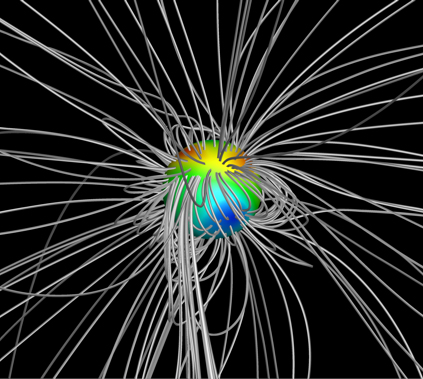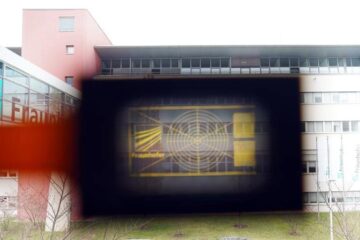Protection from the sun: Scientists show importance of magnetic field for evolution of life

Computer model of the magnetic field lines of the star Kappa Ceti as gray lines looping out from the star’s surface. Credit: Do Nascimento et al.
The scientists studied Kappa Ceti, a star located 30 light years away in the constellation Cetus, the Whale. Kappa Ceti is remarkably similar to our Sun, but younger. It is magnetically very active and its surface is blotched with many giant starspots, like sunspots, but larger and more numerous.
It also propels a steady stream of plasma or ionized gases out into space, a stellar wind that is 50 times stronger than our Sun’s solar wind. Kappa Ceti is between 400 and 600 million years old and its age roughly corresponds to the time when life first appeared on Earth.
“Studying Kappa Ceti can give us insight into the early history of our own solar system,” explains co-author Dr. Sandra Jeffers from Göttingen University’s Institute for Astrophysics.
Without the protection of a magnetic field, such a fierce stellar wind would batter the atmosphere of any planet in the habitable zone – a fate that in our solar system the planet Mars suffered.
In their study, the scientists modeled the strong stellar wind of Kappa Ceti and its effect on a young Earth. “The early Earth’s magnetic field is expected to have been about as strong as it is today, or slightly weaker,” says Dr. Jeffers.
“Depending on the assumed strength, we found that the resulting protected region or magnetosphere of Earth would be about one-third to half as large as it is today. The early Earth didn’t have as much protection as it has now, but it had enough in order to preserve the necessary conditions for life.”
Kappa Ceti also shows evidence of superflares, enormous eruptions that release 10 to 100 million times more energy than the largest flares ever observed on our Sun. Flares that energetic can strip a planet’s atmosphere. By studying Kappa Ceti, the researchers hope to learn how frequently it produces superflares, and therefore how often our Sun might have erupted in its youth.
Original publication: J.-D. Do Nascimento, Jr. et al. Magnetic field and wind of Kappa Ceti: Towards the planetary habitability of the young Sun when life arose on Earth. The Astrophysical Journal Letters 2016. http://arxiv.org/pdf/1603.03937v1.pdf.
Contact:
Dr. Sandra Jeffers
University of Göttingen
Faculty of Physics – Institute for Astrophysics
Friedrich-Hund-Platz 1, 37077 Göttingen, Germany, Phone +49 551 39-13810
Email: jeffers@astro.physik.uni-goettingen.de
Media Contact
All latest news from the category: Physics and Astronomy
This area deals with the fundamental laws and building blocks of nature and how they interact, the properties and the behavior of matter, and research into space and time and their structures.
innovations-report provides in-depth reports and articles on subjects such as astrophysics, laser technologies, nuclear, quantum, particle and solid-state physics, nanotechnologies, planetary research and findings (Mars, Venus) and developments related to the Hubble Telescope.
Newest articles

Wildfire danger to increase due to climate change
WSL Institute for Snow and Avalanche Research (SLF) researchers expect an elevated wildfire danger in the Alpine Foreland from 2040 onwards due to changing meteorological conditions. The danger currently remains…

Advanced Brain Science Without Coding Expertise
Researchers at Helmholtz Munich and the LMU University Hospital Munich introduce DELiVR, offering a new AI-based approach to the complex task of brain cell mapping. The deep learning tool democratizes…

Transparent emissive microdisplays
… for ultra-light and compact augmented reality systems. As part of the HOT project (High-performance transparent and flexible microelectronics for photonic and optical applications), scientists from the Fraunhofer Institute for…





















